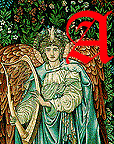[The following passage comes from the author’s The Antagonist Principle: John Henry Newman and the Paradox of Personality, which is reviewed elsewhere on this site. — George P. Landow]

recurring metaphor of his correspondence is that . . . a test [of the Church of England] will be like proving a cannon to see if it will survive its own first blast or merely blow up in the face of the gunners. That test came with Tract 90, Remarks on Certain Passages in the Thirty-Nine Articles, which attempted to prove that despite the highly Protestant tone of the Thirty-Nine Articles, they were nonetheless capable of bearing a Catholic interpretation. The point was profoundly political, not merely theological, since every one of the Church's ordinands, indeed everyone who wished to matriculate at Oxford or graduate from Cambridge, was required to subscribe to the Articles.
One source of Newman's problems in Tract 90 was that there was so little of his own personality in it. Dry, technical, and (like his attack on Hampden) highly selective in its use of evidence, it invited and still invites charges of shuffling, logic-chopping, and inconsistency. Newman appears to have felt that a dry tone, and a close parsing of what the Articles did not say as well as what they did, would deflect criticism, and perhaps allow the Tract to pass under the radar while keeping some of his younger followers in check. No doubt a complex mixture of prudence, timorousness, and calculation figured in his strategy, but on Newman's side it must be said that, arguably, he "shuffled" no more than do the Articles themselves. His miscalculation was that he was so focused on that younger audience, the generation of William Ward and Frederick Oakeley, that he forgot he had other audiences. In the long term, he neither kept the young in check nor persuaded the old of his loyalty.
One of the most nuanced approaches to Tract 90 came from James Anthony Froude, writing at a time when the controversy was still a living memory. Froude saw that Newman, in setting himself to minimize what the Articles said, was on reasonable ground. Froude treated the Thirty-Nine Articles as a kind of committee report, and such reports are generally compromises. The Elizabethan settlement was framed to enable Protestants and Catholics to shelter under the Articles in a form of civil rather than religious adhesion, and it was papal allegiance, not Catholic doctrine, that was the real issue of the day. But Froude also thought that the more specifically anti-Roman wing of the Church, especially after 1688, had changed the landscape; the dominant Protestant interpretation of the Articles had become the coin of the realm. For this reason, Froude concluded, Newman’s strategy was right as a narrative of origins, but wrong in its assessment of the religious climate of the 1840s ("Counter-Reformation" 200-202). [103]
Bibliography
Poston, Lawrence. The Antagonist Principle: John Henry Newman and the Paradox of Personality. Charlottesville and London: University of Virginia Press, 2014.
Last modified 24 November 2014